Johnny Depp-Amber Heard defamation trial: Key points from closing arguments
The weekslong trial began April 11.
Closing arguments in the high-profile dual defamation trial between Johnny Depp and Amber Heard were presented Friday.
The weekslong trial began April 11 in Fairfax, Virginia, and was presided over by Judge Penney Azcarate.
Depp, 58, sued Heard, 36, for $50 million over a 2018 op-ed she wrote for The Washington Post in December 2018. In the piece, she wrote about surviving domestic abuse without identifying her alleged abuser by name. Heard filed a $100 million countersuit against Depp in response.
In their respective testimonies during the trial, both Heard and Depp claimed the other abused them. The former couple, who met while filming 2011's "The Rum Diary" and were married from 2015 to 2017, denied each other's claims of abuse.
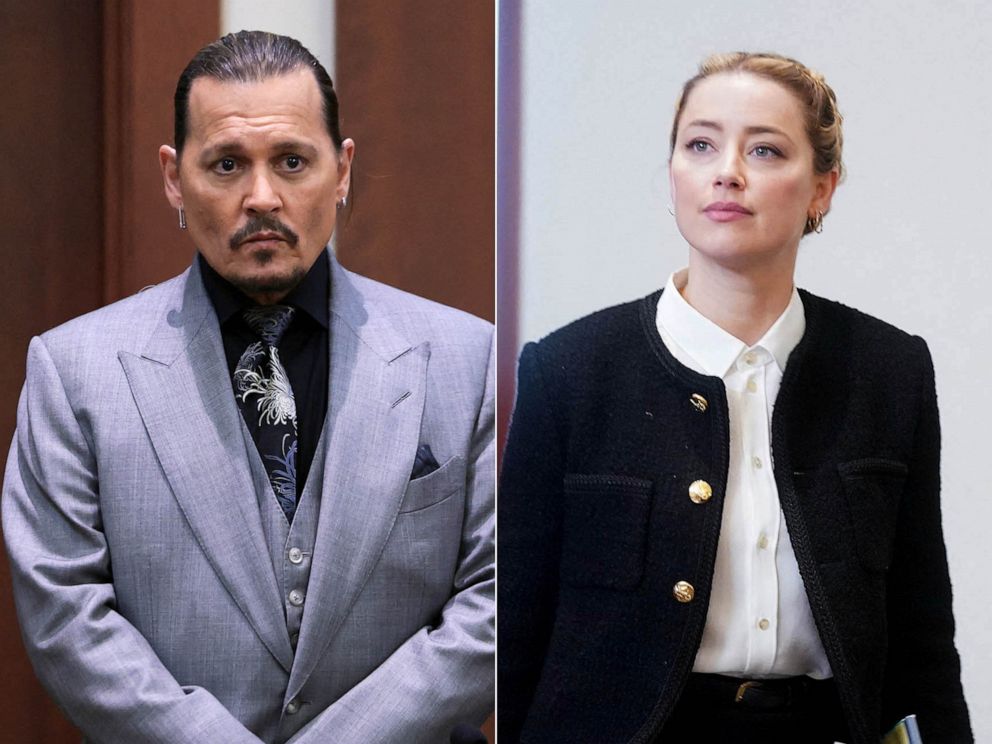
Depp alleged in his testimony that he is the victim of domestic violence, not Heard. He claimed Heard severed a finger on his right hand when she allegedly threw a vodka bottle at him. Depp claimed he didn't report the alleged assault because he didn't want to damage either of their careers.
He also claimed the fallout from Heard's abuse allegations impacted his career, costing him the role of Captain Jack Sparrow in Disney's "Pirates of the Caribbean" film franchise.
Heard admitted in her testimony to being physically violent with Depp, but claimed she had always acted in self-defense. She claimed Depp physically abused her countless times during their relationship and, in one instance, that he had sexually assaulted her with a bottle.
She claimed her role as Mera in the forthcoming "Aquaman" film was diminished in the wake of Depp's denial of any wrongdoing and the negative publicity surrounding her.
Depp's lawyers present their closing arguments
Depp's lawyer, Camille Vasquez, began Depp's closing arguments.
"On May 27, 2016, Ms. Heard walked into a courthouse in Los Angeles, California, to get a no notice, ex-parte restraining order against Mr. Depp, and in doing so, ruined his life by falsely telling the world that she was a survivor of domestic abuse at the hands of Mr. Depp," she began in her statements to the jury.
"Today, on May 27, 2022, exactly six years later, we ask you to give Mr. Depp his life back by telling the world that Mr. Depp is not the abuser Ms. Heard said he is and hold Ms. Heard accountable for her lies," she continued.
During her closing arguments, Vasquez described Heard as "violent," "abusive" and a "deeply troubled person."
"What is at stake in this trial is a man's good name," Vasquez said. "Even more than that, what is at stake in this trial is a man's life -- the life that he lost when he was accused of a heinous crime, and the life he could live when he is finally vindicated."
Vasquez focused on Depp's comments during his testimony about the "persistent verbal and physical abuse" he allegedly suffered from Heard. She also highlighted testimonies from multiple witnesses, including Heard's former friend, Raquel "Rocky" Pennington; Heard's former assistant, Kate James; and an airport employee, Beverly Leonard. In their testimonies, the witnesses described either verbal or physical abuse they allegedly witnessed from Heard.
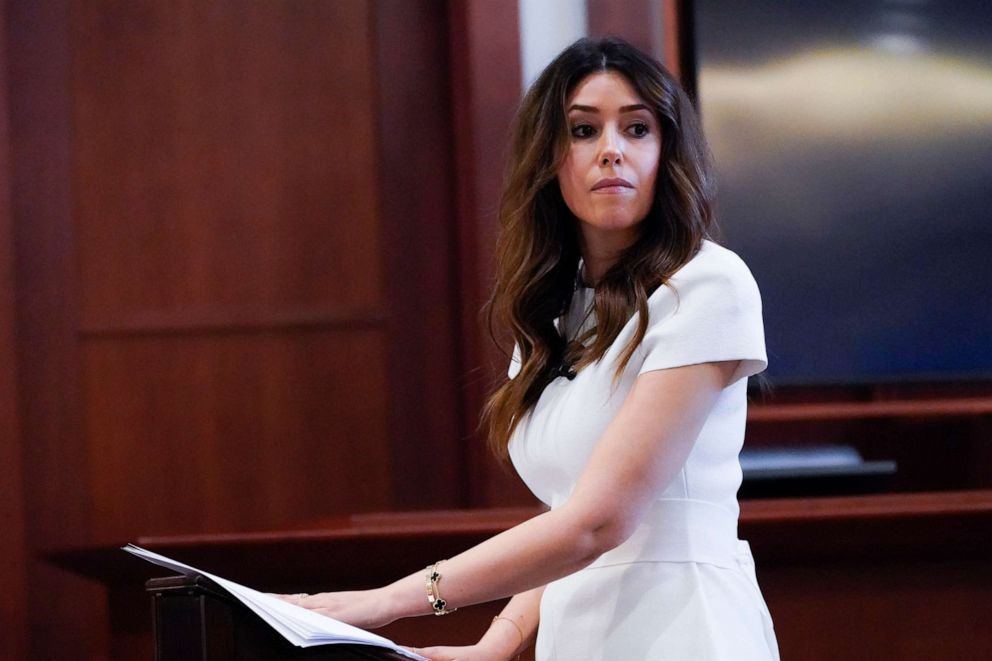
Vasquez also spoke about audio recordings that she says helped illustrate Heard's "temper"; many were replayed during the closing arguments. In one, the actress can be heard admitting to "hitting" Depp. Heard previously testified to being physically violent with Depp, but claimed she was never the primary aggressor and was defending herself.
"The evidence provided at this trial demonstrates that Ms. Heard didn't just want a divorce, she wanted to ruin him," Vasquez said.
During her closing statements, Vasquez once again questioned Heard's donation "pledge" to the American Civil Liberties Union and the Children's Hospital of Los Angeles. Vasquez said it was a "blatant lie" that Heard has not donated the money because she was sued for defamation, which is what Heard previously claimed.
"She had all the money and had month after month after month to fulfill her pledge and actually donate the money -- but she didn't," the lawyer said.
Vasquez said "the giant lie at the heart of this case" was Heard's claim that Depp was an "abusive monster" and that she is "a public figure representing domestic abuse." She called Heard's side of the story "a performance, the role of her lifetime."
Vasquez questioned why there aren't more images of the alleged injuries Heard says she sustained at the hands of Depp. Mentioning apology texts from Depp to Heard that were previously shown in court, Vasquez said that Depp never apologized in these texts for being physically violent. She claimed that contrasted the evidence shared in the trial that showed Heard allegedly admitting to being physically violent.
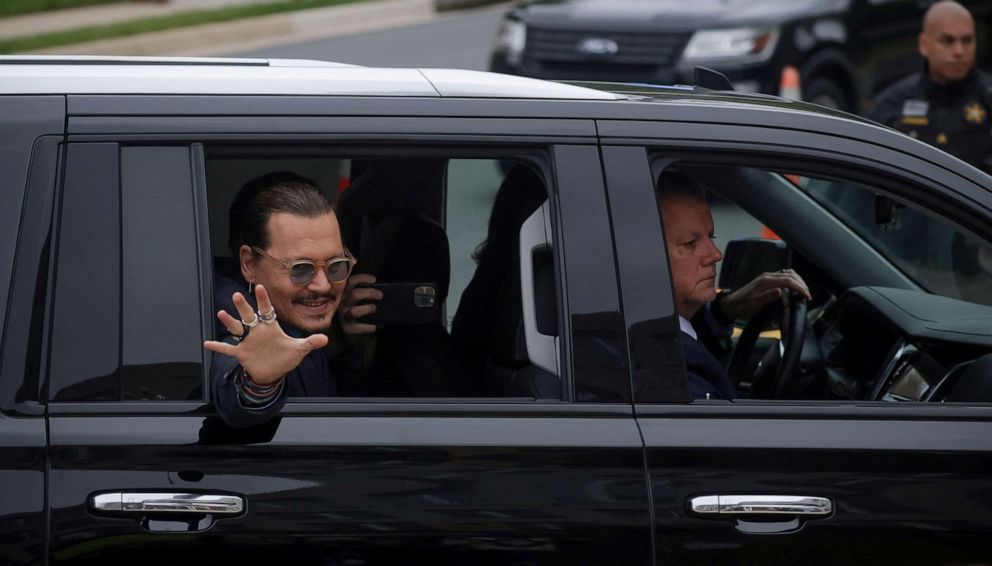
The lawyer then showed a series of photos of Heard after alleged abuse she had endured from Depp, questioning if Heard's appearance in the photos "are consistent with the brutal assault and serious injuries Ms. Heard has testified to" at the hands of Depp.
Throughout her statements, Vasquez highlighted many incidents Depp recalled in his testimony of Heard allegedly abusing him. Vasquez specifically highlighted Depp's recollection of physical violence that he says occurred in Australia in 2015 -- when Depp claimed Heard severed a finger on his right hand when she allegedly threw a vodka bottle at him.
"You can't pick and choose which of these wild allegations to believe and which ones to discard. You either believe all of it or none of it," Vasquez said. "Either she's a victim of truly horrific abuse, or she's a woman who is willing to say absolutely anything."
Ben Chew, another member of Depp's legal team, argued that no woman ever accused Depp of domestic violence before Heard, saying, "This is #MeToo without any #MeToo."
He mentioned Depp's abuse of drugs and alcohol and said Depp has admitted he's struggled with substances. "Mr. Depp is no saint, and he has never claimed to be one," Chew said. "He has made mistakes in his life, as we all have. Yes, he has struggled with drugs and alcohol, but you never heard him deny that. We told you that in the opening statement. He owns his flaws, he admits to them, he told you all about them -- but he is not a violent abuser."
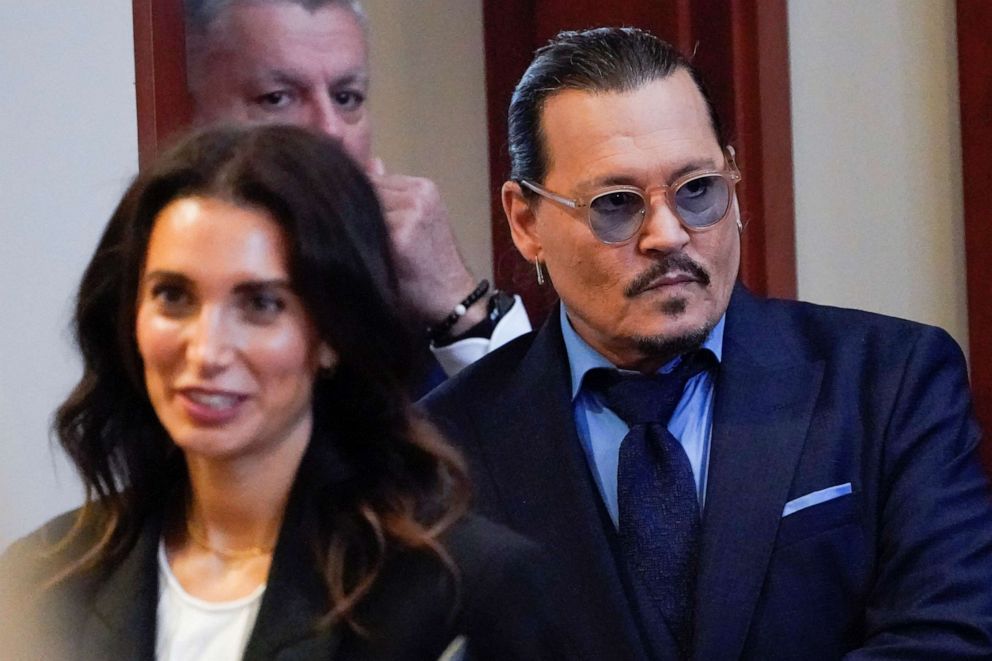
Chew mentioned multiple witnesses in the entertainment industry who took the stand throughout the trial to share opinions on how damaging they felt Heard's 2018 op-ed was to Depp's career.
"Mr. Depp wasn't canceled by Hollywood because he was sometimes late to set," Chew said. "He was canceled because Ms. Heard falsely accused him of domestic violence and sexual violence on the pages of The Washington Post on Dec. 18, 2018, repeating the prior lies of May 17, 2016."
Chew ended the closing arguments for Depp's side of the case by saying this trial has never been about money or "punishing Ms. Heard" and instead is "about Mr. Depp's reputation and freeing him from the prison in which he has lived for the past six years."
Heard's lawyers present their closing arguments
Ben Rottenborn, one of Heard's lawyers, began closing arguments by asking jurors to think about the "message" he said Depp and his legal team are sending to Heard and victims of domestic violence:
"If you didn't take pictures, it didn't happen. If you did take pictures, they're fake. If you didn't tell your friends, you're lying. And if you did tell your friends, they're part of the hoax," he said. "If you didn't seek medical treatment, you weren't injured. If you did seek medical treatment, you're crazy."
"If you do everything that you can to help your spouse, the person that you love, rid himself of the crushing drug and alcohol abuse that spins him into an abusive rage-filled monster, you're a nag," he continued. "And if you finally decide that enough is enough -- you've had enough of the fear, enough of the pain and you have to leave to save yourself -- you're a gold digger. That is the message that Mr. Depp is asking you to set."
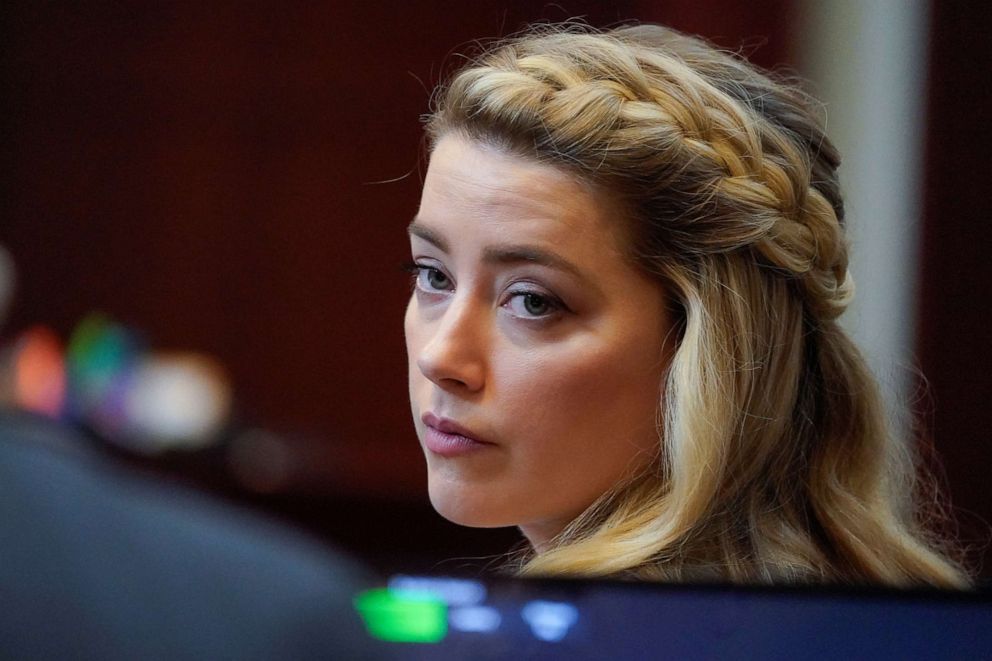
During his closing arguments, Rottenborn asked if the First Amendment gives Heard the right to author The Washington Post op-ed "without having to go through the hell that Ms. Heard has gone through."
"You cannot simultaneously protect and uphold the First Amendment and find in favor of Johnny Depp on his claim," he said.
Rottenborn asked the jury to re-read Heard's article in full and "think of the article's purpose." He claimed, "The purpose of the article was to promote legislative measures designed to protect victims of domestic abuse, designed to protect people who did exactly what Ms. Heard did: to speak out."
He reiterated that Heard did not detail what she allegedly suffered from Depp in the article, and stated, "This isn't a hit piece on Johnny Depp."
Rottenborn claimed that if Heard had been abused by Depp even once -- either physically, emotionally, psychologically, financially or sexually -- then his client wins. He then displayed various graphic text messages from Depp that were presented in cross-examination, which he said showed "some of the most vile, disgusting language that you could ever imagine."
"These words are a window into the heart and mind of America's favorite pirate," he said. "This is the real Johnny Depp."
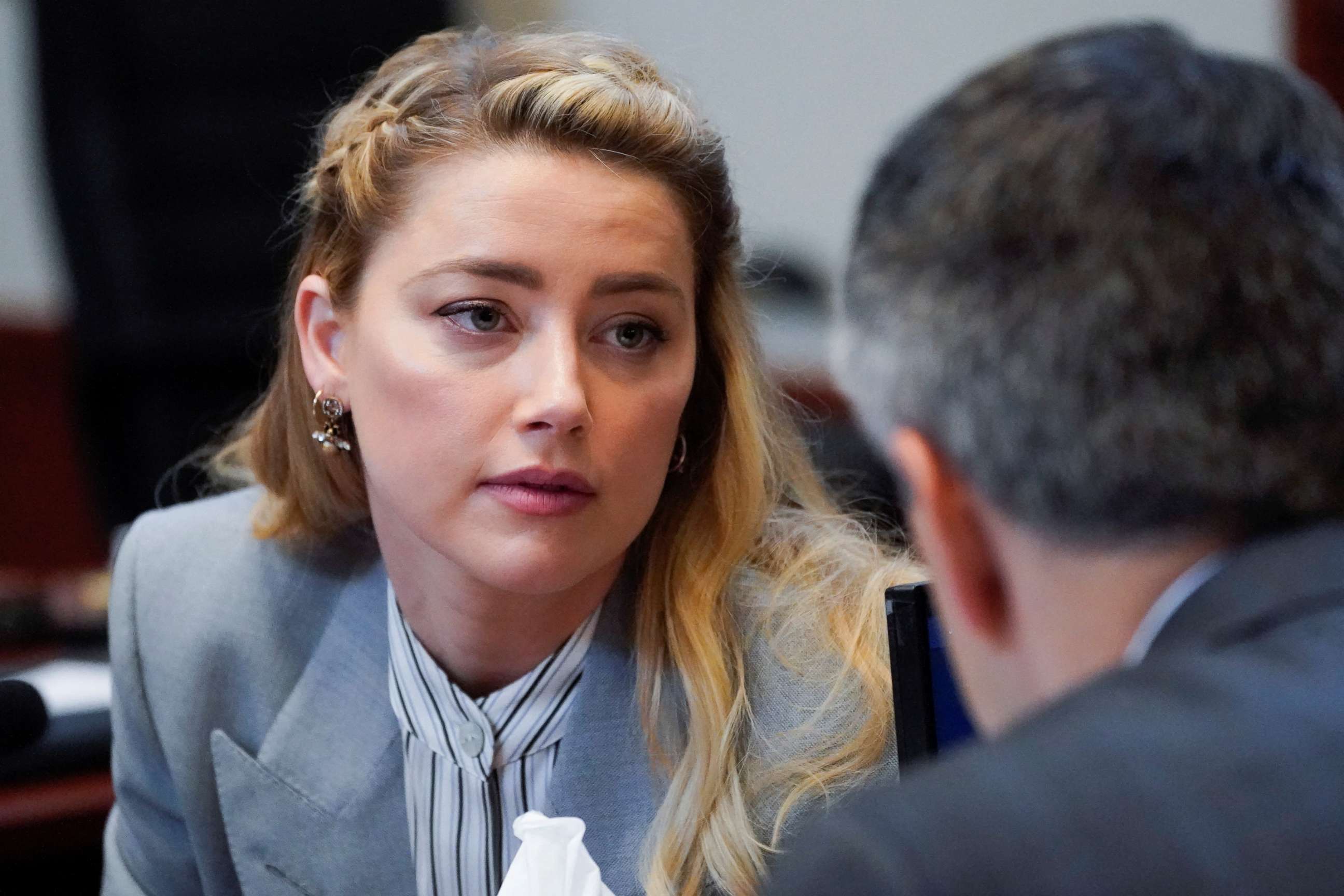
Rottenborn alleged that "almost all" of Depp's witnesses are on the actor's payroll. "They're scared to say anything bad about him, and they've seen what happens to people who do," Rottenborn said.
He also said that Heard apologized to Depp during many of their alleged physical fights because that is what many victims of abuse do in an attempt to appease their partners.
"This trial is about so much more than Johnny Depp versus Amber Heard," Rottenborn said in wrapping up his closing arguments. "It's about freedom of speech. Stand up for it and reject Mr. Depp's claims against Amber."
Elaine Bredehoft, another member of Heard's legal team, asked the jury to hold Depp "legally responsible for his actions and to fully and fairly compensate Amber for what he has done by creating this concept of a hoax for the defamation that he has committed."
Bredehoft spoke of Heard's plans to donate the $7 million from her divorce from Depp to charity, a topic that has been debated intensely in the trial.
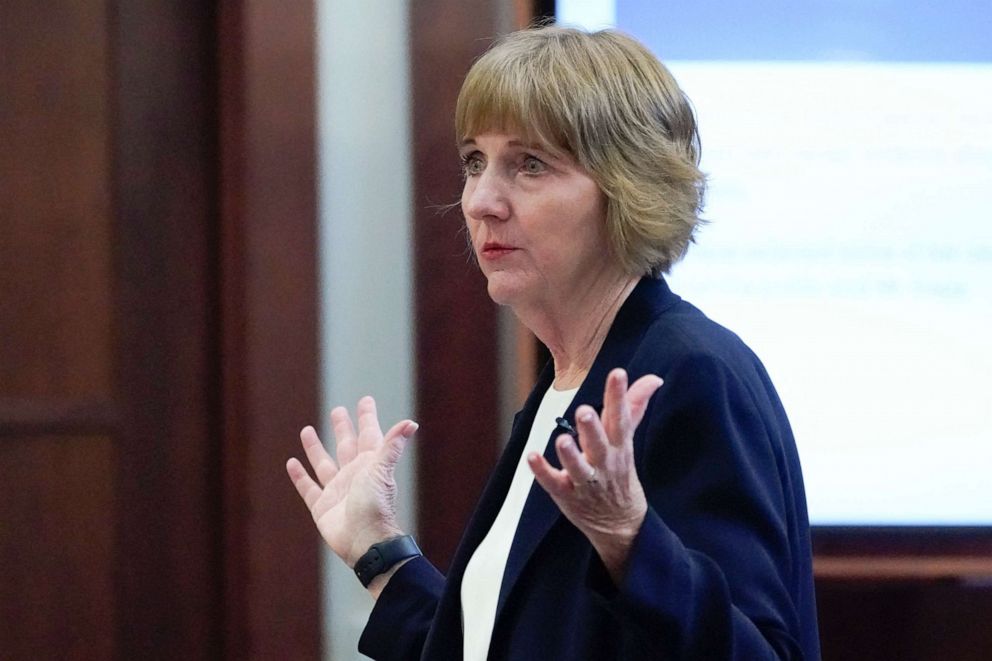
She claimed payments to the charities have paused because Heard "got sued here and hasn't been able to" finish the full donation because she has incurred $6 million in attorney fees. Bredehoft claimed that both the ACLU and Children's Hospital have said there's no expiration date for Heard's pledge and she can pay them "whenever she wants to."
Bredehoft also brought up Heard's role in "Aquaman 2" and reiterated the actress' claim that her spot in the sequel was diminished in response to defamatory statements made about her related to Depp. She argued that Heard's career trajectory following the release of 2018's "Aquaman" was negatively impacted due to the defamatory statements and that her star has been "extinguished."
Bredehoft also spoke about the intense hate Heard has received from the case, including death threats to her and her daughter, and said her client is suffering by having to relive the painful alleged experiences she's shared as the trial has unfolded.
"It has destroyed her life," she said. "It has consumed her."


